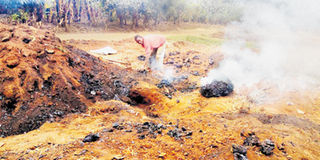Why charcoal production is big threat to natural forests

What you need to know:
- According to available information in the ministry of Energy and Minerals and studies carried out by Professor Romanus Ishengoma; Mr. Bariki Kaale, Eng Estomih Sawe and the World Bank indicate that biomass fuels (mostly charcoal and firewood) account for about 90 per cent of the national energy balance.
Charcoal is the main source of household energy in urban and peri-urban areas. It is mainly used for cooking.
According to available information in the ministry of Energy and Minerals and studies carried out by Professor Romanus Ishengoma; Mr. Bariki Kaale, Eng Estomih Sawe and the World Bank indicate that biomass fuels (mostly charcoal and firewood) account for about 90 per cent of the national energy balance.
In that context, charcoal is regarded as an important forest product, but how this commodity is produced, traded, handled and utilised leaves a lot to be desired.
However, it is a big business worth about $1 million annually. It is traded inside and outside Tanzania (though export of charcoal is not allowed by law, but it is illegally done).
Although charcoal is an important commodity as far as life in the urban and peri-urban areas is concerned, it is the household energy that has not been properly handled with the national energy policies.
Whereas the state, through the ministry of Energy and Minerals (MEM) struggles to improve sources of energy for the mainland, most of the efforts have mainly focused on about 10 per cent of the national energy balance leaving aside the 90 per cent to take care of itself thereby leading to excessive felling of trees, hence causing negative impacts on environment.
The national energy policy for decades has been emphasing on expansion and improving energy supply and distribution from such sources like electricity generated from hydropower, oil, natural gas and to some extent solar and some renewable energy sources (of which charcoal and firewood are included), but very little done to improve charcoal supply as well as entire charcoal value chain and with the view to enhance environmental conditions through sustainable wood-fuels production with effective engagement of the private sector and in the process creating more employment opportunities and enhancing government revenues.
Mr Sauli Gillard said recently that it was encouraging to note that the President during his official visit in Tabora Region decried indiscriminate felling of trees for charcoal.
On this issues the President John Pombe Magufuli said: “Allowing people to invade forests and clear some oldest and unique species of trees just to make charcoal for the sake of getting votes is not good. We destroying our country.”
Additionally, the President stated: “just imagine a 20-year-old man clearing a 150-year old tree just because of charcoal an there is no replacement. I must tell you the truth this is not acceptable.”
It is true. Even the Forest Act (Cap323 RE: 2002) and its regulations state that no one is allowed to fell trees a legal permit (licence or written authorisation from the Director of Forestry or Authorised Officers on behalf of the Director or the Chief Executive of the Tanzania Forest Services (TFS) an Agency operating on behalf of the central government.
Rampant felling of trees and/or clearing natural forests/woodlands especially in reserved areas and public forest/woodland areas also in village lands has been taking place for decades due to inadequate capacities in government (central/local authorities) institutions and village councils to enforce laws and by-laws and by making sure that the natural heritage such as the forests and woodlands including the wildlife resources are managed and utilised in a sustainable way.
On the other hand, it has been a weakness due to inadequate political will as the President has cited while visiting some areas of Tabora Region especially at Kaliua District where persistent and widespread destruction of environmental resources has been taking place for long.
Sometimes when I was still in government services visited several villages in Kaliua area and faced the same challenge as has been witnessed by the President. What the President saw in Tabora Region (or in other Regions) is the general picture of practices that have been taking place and still occurring throughout the country with wanton destruction of natural forests in the context of political arena particularly during periods of elections with all political parties (not only CCM but also opposition parties) trying to win votes from the local communities living adjacent to forests and woodlands and some reserved as national treasures for environmental and biodiversity conservation while others conserved as very critical sources for water supply.
However, in the context of staggering political will many of such important forest/woodland resources have been turned into ashes, settlements, grazing grounds in addition to charcoal and timber for quick money making?
It was very unfortunate that government’s political and decision makers opted to abolish the post of Forest Guards: a decision that was enforced on the pretext of reducing the government size.
The criteria used hinged on understanding that natural forests and woodlands can always sustain themselves without being guarded by anyone hence existence of Forest Guards was considered as irrelevant therefore removed from the Forestry and Beekeeping Division’s list of employees. The decision was also effected in the context that forestry is not a priority sector as the case is for water, education, health agriculture or infrastructure.
This has indeed affected the wellbeing of our natural forests and woodlands due to lack of effective management hence human activities have been taking place in a manner regarded as free-for-all (Shamba la Bibi) natural endowment with no authority governing its use.
The consequences of such uncontrolled human activities in natural forests and woodlands have been very detrimental to indispensable ecological, environmental services like sustainable water supply in streams/rivers; enhanced climate change; soil conservation and biodiversity protection including habitats to wildlife.
It is encouraging to note that the national top political leaders: the President, Vice President, the Prime Minister, the Ministers responsible for Environment, Lands Agriculture and Natural resources and Tourism including some Regional and District Commissioners have realised that as a nation something must be done to stop indiscriminate destruction of natural heritage in order to revamp ecological services that are generated through existence of healthier and well conserved forest/woodland resources.
Referring to the project to supplying water from the Malagarasi River to neighbouring local communities, the President cautioned that the water project from Malagarasi River may not be sustainable simply because the precious liquid (water) is drying.
On that note the President added by saying “if you flashback 10 years ago, the water in Malagarasi River is drying but this is because the people are clearing trees.
People are invading Forest Reserves to wantonly cut trees” reported Mr. Sauli Gillard of Daily News, Monday July 24, 2017.
It is imperative that the position indicated by the Hon. President of the United Republic of Tanzania is, indeed, a vital political will that the conservationists and forest and wildlife resources managers should capitalise on to upscale efforts to safeguard the national heritage for the good of all Tanzanians.
To attain effectiveness in conservation and sustainable utilisation of natural forest and woodland resources, I humbly request the national leaders to seriously reconsider and reinstate the Forest Guards in order to reduce, to great extent, indiscriminate clearing of forest and woodland resources for charcoal and other forest products as well as loss of critical forests/woodlands due to shifting cultivation and overgrazing.
Once this is attained there will be significant improvements in ecological services including sustained water supply in streams/rivers, enhanced habitats for biodiversity and wildlife resources, enhance food security and nutrition including favourable climatic conditions.
Dr. Felician Kilahama, Chairman Board of Directors, Tanzania Forestry Research Institute (TAFORI), Morogoro, Tanzania .




